Hello World,
Ubuntu 13.10 has been out for one week already ! We had already performed the installation of the new operating system (fresh installation) in order to evalute this new release. If you follow me, you know that I like to use xrdp package in order to connect to my ubuntu machine using the built-in remote desktop client available within Windows Operating system. This is a convenient way to manage remotely your environment if you have a mixed infrastructure (i.e. Windows and Linux machines). We prefer xrdp to vnc because we do not need to install any additional software on our windows or linux machine. However, xrdp is showing some real limitations when trying to connect to new Linux Desktop environments.
Is xrdp broken in Ubuntu 13.10 ?
With this release (Ubuntu 13.10), the standard installation that we have described in these previous posts
- How to install xrdp in Ubuntu 13.04,
- How to install xrdp in Ubuntu 12.10,
- How to install xrdp in Ubuntu 12.04
does not allow you to remote desktop to ubuntu 13.10. To be more precise, you will be able to perform a remote desktop connection but you will end up with a grey screen after performing the xrdp login (see screenshot below)
Click on picture for better resolution
xrdp is not broken in Ubuntu 13.10. It seems that gnome packages are broken or have changed in way that xrdp is not able to perform remote connection anymore. The good news is that we have found a workaround in order to have remote desktop session “working” against Ubuntu 13.10. We have found this workaround by pure luck. We have received this question/comments
Click on picture for better resolution
So, we have tried to install the xfce desktop environment and try to perform a remote desktop connection against an Ubuntu 13.04 and it works ! After scratching my head against the xrdp, Ubuntu 13.10 and gnome-fallback session, we tried to use the xfce desktop and it worked again. So the workaround here is simply to use another desktop environment (which in our case will be xfce)
Installing xrdp and have it working in Ubuntu 13.10
In this post, we will use the standard ubuntu xrdp package. You know that a limitation/downside of the package is that you cannot reconnect to your session when you disconnect your remote desktop connection. In the coming post, we will check if the procedure to reconnect to the same session is working in Ubuntu 13.10 combined with xfce desktop interface.
Stop talking….Time for installation and configuration activites….
Installing xrdp package
You can install the xrdp packages from the desktop or from the command line.
From the command line, you simply type the following command
- sudo apt-get install xrdp
From the desktop, you will click on the Ubuntu Center Software icon (see point 1 in screenshot below). The Ubuntu Center software center applet will start. In the right top corner, type the following word in the search box xrdp (see point 2 in screenshot below) and press enter. You should see in the main pane, the result of your research (point 3).
Click on Picture for better Resolution
Click on the xrdp package and you will see that the install button is dipslayed. Click on it
Click on Picture for better Resolution
You will be prompted for authentication. Provide your password and Press OK
Click on Picture for better Resolution
Wait for the installation to complete.
Restart your machine in order to ensure that the xrdp service is configured to automatic startup.
By default, the VNC4server package has been installed as well. If you try to perform a remote desktop connection, you should see the xrdp login page but the remote desktop operation will fail
Click on Picture for better Resolution
Installing xfce package
It’s time to install the alternative desktop. In the past, we would use the gnome-fallback environment but apparently the package is broken or changed and cannot be used anymore with xrdp. So, we will need to install a new desktop interface supported by xrdp and we will need to configure ubuntu 13.10 to use this one. To install the xfce package, you will from a command prompt (easiest) type the following command :
- sudo add-apt-repository ppa:xubuntu-dev/xfce-4.10
- sudo apt-get update
- sudo apt-get install xfce4
Configure your session to use xfce
This is the same as before. You will need to create the .xession file for your user and append the following line xfce4-session. To perform this operation, we use the command line (easier). From terminal type the following command
echo xfce4-session >~/.xsession
You will need to restart the xrdp service in order for the change to be applied. From the Terminal prompt, type the following command
sudo service xrdp restart
Click on Picture for better Resolution
Configure your keyboard layout in the xrdp login page
This is the same procedure as before. By default, xrdp login page will be configured with an US keyboard layout. If you are working with a different keyboard layout, you will need to perform the following operation. In my situation, I’m using a Belgian keyboard layout.
Step 1 : You go to the /etc/xrdp directory (cd /etc/xrdp)
Step 2 : you issue the command setxkbmap -layout <%your layout%> to define which keyboard map/layout to use (in my case, setxkbmap be for belgium layout)
Step 3 : create a copy of the km-4090.ini file into the same directory. It seems that this is the default file used by xrdp to define the keyboard layout. You will need to use sudo in order to be able to write into the directory
Step 4 : Check that you have a backup of your file by typing the dir or ls command
Step 5 : update the file by issuing the following command sudo xrdp-genkeymap km-080c.ini (where km-080c.ini is the file needed for Belgian keyboard)
Click on Picture for better Resolution
At this stage, you should be able to perform a remote desktop connection against your Ubuntu 13.10 machine.
Click on Picture for better Resolution
Final Notes
As you can see, as a quick fix, we have simply replaced the gnome-fallback desktop solution with an alternative desktop xfce environment. Using this desktop, we were able to make xrdp working again. In this post, we have used the default xrdp package that has one known limitation: you cannot reconnect to the same session. We have already described in a previous post how to use the X11vnc and the xrdp source package in order to allow a user to reconnect to the same session.
Till next time
See ya

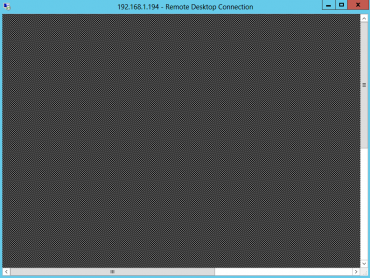
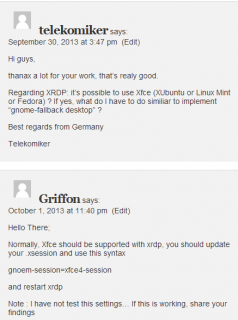
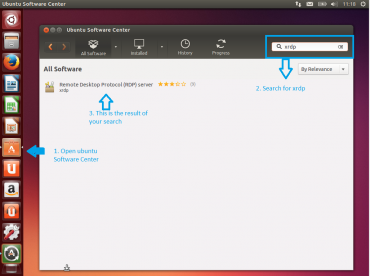
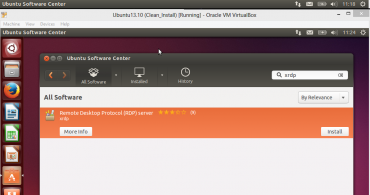
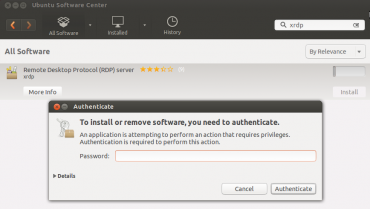
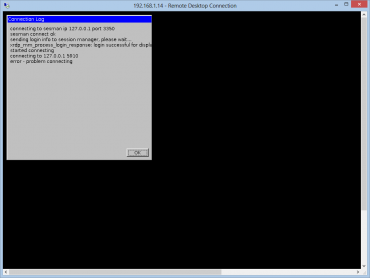
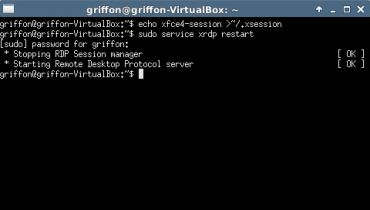
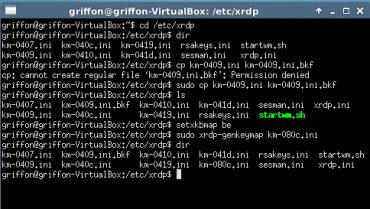
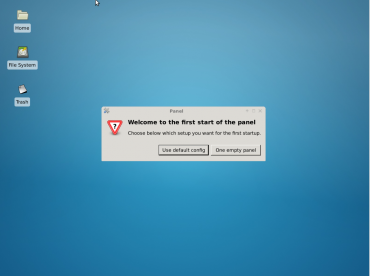
This is working great for me on Xubuntu. Thank you for everything that you do!
Hey Ryan,
I’m happy that this blog is helping you out… To answer your previous question, if you use X11Vnc, you will be able to reconnect to the same session… We will update the previous posts as well
Thank for the visit and constructive comments 🙂
Till next time
See ya
Thanks for the tip about Xfce. I found it was available in the default repositories, no need for add-apt-repository …
Hello there,
thank you for the tip
Tlll next time
see ya
I’ve been doing this for a while also. xfce, lxde both still work ok but with 13.10 Unity no longer has a Unity-2d mode to “fallback” to.
You might also be interested into looking into 2 other remote desktop projects.
x2go (x2go.org) – works great and is probably the best opensource remote desktop (client/server) solution I know of right now. Installing on the server only involves:
$ sudo add-apt-repository ppa:x2go/stable
$ sudo apt-get update
$ sudo apt-get install x2goserver x2goserver-xsession
# you may need to edit /etc/ssh/sshd_config and set both the following to ‘yes’ then restart ssh
ChallengeResponseAuthentication yes
PasswordAuthentication yes
on client side add the ppa as above and do a sudo apt-get update
then
$ sudo apt-get install x2goclient
There are native x2goclients for Mac, Windows and Linux
The other interesting project is Guacamole (www.guac-dev)
Guacamole is fairly easy to install on the “server” side but it implements an HTML5 remote desktop access capability so clients ONLY need an HTML5 compatible browser.
Guacamole by default uses VNC but you also can be configured to support RDP (xrdp on a linux desktop server).
I should have mentioned that x2goclient’s support a variety of protocol/desktops
Gnome (2)
Unity (2d)
MATE
xfce
lxde
RDP
(custom)
Performance of x2go over a WAN is also very good. audio, remote printing, remote file shares all work out of the box so to speak
Hello Brian,
Thank you for the inside….
We have already worked with X2GO and Guacamole….We also worked with FreeRDP project (and the FreeRDP Web connect version as well).
We might look back into these solution since xrdp project is not supporting modern Desktop environment…
Thanks for the visit
Till next time
see ya
Thanks for all your xrdp related musings.
Genuinely hoped it might all go smoothly with 13.10 but suppose i shouldn’t be all that surprised given it’s not worked out the box for long enough for me to be making bets with myself about it during the upgrade process.
Anyway just wanted to say cheers, your posts are a great time saver to all the people left scratching their head with each new release.
Hello Gerg;
Thank you for the positive comments…Good to hear that my small blog is helping people out there… 🙂
Till next time
See ya
Hi Griffon,
regarding my question of Seotember 30 and your answer:
No, unfortunately it doesn’t work. Maybe it I dit not describe the main problem:
xrdp and xfce is working well. BUT: if I switch to fullsreen using ctrl+alt+enter, the screen switchs to black. There is no refresh, so you can see nothing. If you hold the left mouse button presses an move over the screen, the desktop will appeares, or you lock the screen and unlock it. Then you got a refresh … and you can work.
What can I do tho solve ist ?
Hello
I do not have encountered this issue
I’ll try to reproduce this but we might have no fix for that. You already describing a workaround that seems to work
Till Next Time
See ya
Man, that was really helpful!
I have just installed the latest Ubuntu release 13.10 and the same ugly grey screen appeared. Your fix worked smoothly 🙂
I could not reconnect to the same session yet, although I tried the steps you proposed in the other entry. I still need to work on that.
Anyway I just wanted to thank you!
C
Hello Carlos,
Sorry for the late answer…. busy busy
To reconnect to the same session,
you should follow these instructions http://c-nergy.be/blog/?p=4168 instead of these http://c-nergy.be/blog/?p=4471
The first one has been tested and seems to work as expected
Till Next Time
Se ya
Thanks a lot for this post, it worked great and it is even better than xrdp, you can log off or power off Ubuntu host. Thanks!
At last a Solution… Thank you
Hi There – Great guides, thank you!
Still no solution for getting Unity working over xRDP with ubuntu 13.10?
If so, this really sucks.
Thank you for all your work.
Hello Xinud,
So far, unity is still not working with xRDP…..
With the switch over to Mir as a display manager, we are not sure that xrdp will be still useable… but we will see
thank for your visit
Till next time
See ya
Great tutorial!!!
Thank you for the comment and the visit
See you soon
Till Next Time
Great work, thank you!
Thank You brian mullan,
Good tip!
Thank You Griffon for the article.
Hi, thank you for the tutorial, by now i do get connected to my linux-server via xfce4 instead of a grey screen via gnome or ubuntu.
I do have one issue that doesn’t quite work:
When i use the RDC in Win8.1 the connection is established and I get the xrdp-login screen but the keyboard layout is still qwerty! And when I am connected to the xfce4-desktop i remains qwerty, no matter which keyboard input method I try to install…
Any suggestions?
Hello Erwin,
Which keyboard layout is broken ? The one at the xrdp login screen. If this is the one; check the section on the same article called “Configure your keyboard layout in the xrdp login page”. If you need to have a special keyboard layout during the xfce session through XRDP, You would need to update the startwm.sh file
just after the comment lines (#), you can add the following code
if [ -r /etc/default/locale ]; then
. /etc/default/locale
export LANG LANGUAGE
fi
We assume that you have a locale file configured and listing the languages you want to use (for example Belgian French or Italian or Spanish or whatever)
restart the xrdp service and give it a try
Hope this help
Till next time
see ya
Hi,
Thanks for the info! Actually I used an older post of you as reference to get the keyboard layout working (making a backup of km-0409.ini etc..)
I now have another issue for which I cannot find an answer via Google:
I have a Raspberry Pi which has a standard password ‘raspberry’. I installed x11vnc and xrdp and I can connect via Windows to the active session on the RPi. The problem is that when I change my password locally to ie ‘test1234’ and do a restart, I cannot logon via xrdp using the new password, but I still have to use the old one, ‘raspberry’. Somehow he keeps the password for remote use somewhere else? How can I change the password for my pi-user so it also changes for remote use, and can I do that also remotely?
Hello Erwin,
I will need to check for that. In theory, this should be working out of the box…I’ll check if I find back my rasperry and give it a try
Till next time
See ya
thanks! worked on the first try 🙂
Cool…
Thank for the visit and feedback
Till next time
See ya
Thank you for solution ! 🙂
Thank you Griffon. I am fairly new to desktop linux. I am using Ubuntu Desktop 14.04 LTS, QUERY, English. I picked xrdp based on what I read about Windows to linux rdp. I struggled with all of the problems that others have had. Your solution is the first that has worked for me. It is simple, and it’s rationale is understandable. Some comments. First, the obvious. It works on 14.04! Next, xfce4 v4.10.1 is now in the updated ubuntu repository, so no need to add the ppa. Third, I did not have a prompt in the xfce terminal. It turns out that the colors in the default profile preferences on the terminal’s Edit menu were set to “use colors from system theme.” These turned out to be black on black. I unclicked the option and set them to black on white. Everything works perfectly so far. Thanks a bunch!
Hello Greg,
thank you for your comments and positive feedback..
Just for your information, we have already published a post on how to use xrdp with ubuntu 14.04 and with 14.10.
We have also published some posts about using mate-desktop,xfce or lxde desktop interface.
Thank you for the additional information
till next time
See ya
Thanks, Griffon, for your reply. Yes, after I posted I did some more surfing. My face was a bit red, and I wished I could withdraw my post. I did get set up with the lxde interface (you expressed a preference for it). It seems to be working well. I have not done much stress testing, yet, but your reconnect scheme seems to still be needed in 14.04. Without your help I am sure I would still be mucking around with this into 2015. Thanks again. Greg
Hello Greg,
no problem…We were just pointing to useful information…
By the way, you might wanna check our latest post about xrdp and ubuntu 14.1O where you do not need to do any tweaks to reconnect to your remote session
View the quick demo : http://c-nergy.be/blog/?p=6063
Step by step process : http://c-nergy.be/blog/?p=6046
Hope this can help you as well
Thanks for the visit …..
Till next time
See ya
Thankyou so much for the post! I am setting up Linux hosts on Azure. The blank screen really through me. I installed putty for MACs and connected to allow me to get to the terminal. A great post for installing putty is below:
http://codingsteps.com/installing-and-using-putty-on-mac-os-x/
Hello Mark,
Thank you for the feedback
Till next time
See ya
Thank you for this! Really helpful!! 😀
Lynnet;
Thank for your positive feedback and confirming that this process is still working 🙂
Till next time
See ya
Hey Griffon ,
Thankx for xrdp.
Please write down something about Thin-Client Sever in Ubuntu .
I want Configure Thin-Client Server but its showing more issues so please help about thin-client.
Hello Sandy,
Take you for the feedback
we will try to write up something about Thin-client in Ubuntu (if time permits)
Till next time
see ya
Thank you very much.
Its working finally with xfce4. Except that text in terminal is not visible by default. Its visible after changing the color setting.
Looking for a solution to mount other partitions in a simple way like in unity desktop. Its giving error “Not authorized to perform operation”.
Hello Sugunakar,
Thank you for the feedback and information
For your problem, If you have performed an upgrade of your Ubuntu System, This might help you in fixing your issue (https://bugs.launchpad.net/ubuntu/+source/policykit-desktop-privileges/+bug/1240336 – see answer #19 )
Hope this help
Till next time
See ya
thanks, works well in lubuntu. only thing, I installed it directly using apt-get install xfce4.
@manoj,
Good to see that this post are still valuable…Thank for the feedback and your visit
Till next time
See ya